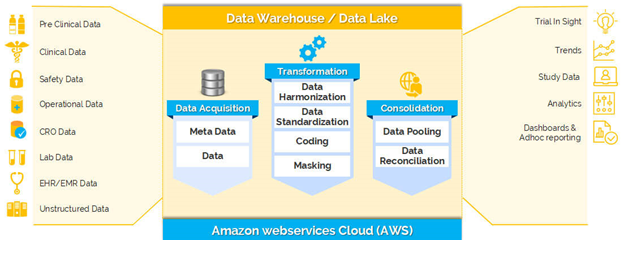Data Warehouse
Clinical Data Warehouse & Automation Console
Clinevo Data Warehouse is an easy to use, secured, regulatory compliance clinical trials data repository & warehouse to acquire, store, transform, consolidate and report diverse data of clinical trails in one place.


Efficiency, Usability, and Compliance
Clinevo Data Warehouse focus es on enhancing operational efficiency, ensuring regulatory compliance, and delivering a user-friendly experience.
Audit / Regulatory Compliant
Clinevo Clinical Data Warehouse / Clinical Data Repository complies with 21CFR part 11, Annex 11 and GxP regulations
Faster User Adoption
Existing clinical trials business team, technical team, and validation team can be trained on Clinevo Clinical Data Warehouse / Clinical Data Repository within a week
Easy accessibility
Clinevo Clinical Data Warehouse / Clinical Data Repository is a user-friendly web application that can be accessed via the internet or intranet using IE, Chrome, and Firefox browsers
Lower TCO and Easy Maintenance
Clinevo Clinical Data Warehouse / Clinical Data Repository is built on a simplified technology stack (Java and Oracle DB), offering numerous configurations with minimal customizations, leading to lower total cost of ownership (TCO) and easier maintenance
Faster Study Setup and DB locks
Simplified security, easier study/object creations, and installation to set up studies faster.
Simplified database locks.
Reusable metadata and program library.
Simplified database locks.
Reusable metadata and program library.
Increased Efficiency and Automation
Robust incremental refresh to get the data refreshed within 4 hours from a heavy source system.
Incremental data refresh for non-primary key tables.
Incremental data refresh based on data element group.
Parallel Data Loading.
Configurable Automated Data Loads.
Incremental data refresh for non-primary key tables.
Incremental data refresh based on data element group.
Parallel Data Loading.
Configurable Automated Data Loads.
Why Choose Clinevotech's Software Solutions?
Global Trust
Clinevo tech’s software solutions are trusted by life sciences, pharmaceutical, biotech, and CRO clients across the USA, the UK, Europe, Korea, Japan, China and India.
Compliance-Driven
Built with industry regulations, our software includes automated compliance checks, robust audit trails, and tools to ensure adherence to guidelines and standards.
Cost-Effective
Reduce the need for infrastructure and manual processes. Our cloud-based software provides an efficient and affordable solution tailored to your needs.
End-to-End Process Management
From initial setup to final reporting, our software supports every stage of your workflow, ensuring organized, compliant, and up-to-date process management.
Expert Support
Our experienced team offers dedicated support for implementation, training, and ongoing assistance, ensuring the success of your operations.